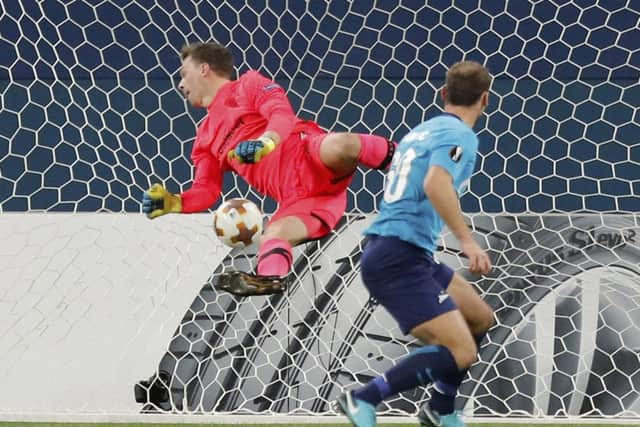Why the glass ceiling is getting lower for Celtic in Europe
The aggression, discipline and drive that allowed the Scottish champions to take a 1-0 lead to Russia was replaced by a timid, slipshod and meandering approach as they were comfortably snuffed out 3-0 by Roberto Mancini’s men.
There is no disgrace in exiting Europe against a far more expensively-assembled Zenit. Next month only around a dozen of the original 54 nations will have representatives in continental competition – and a mere smattering of these will come from outside the top eight countries. There is, though, entitled to be dismay at doing so in such a flat fashion.
Advertisement
Hide AdAdvertisement
Hide AdAs a counter-attacking team, Zenit exhibited absolutely no desire to apply sustained pressure to Celtic. They sat off them for long spells and relied simply on the shortcomings that, damningly, they seemed to know would be revealed in their opponents’ ranks.


Rodgers will surely be of a mind that – all things being equal – among the back five he selected last night only Kieran Tierney would be a starter when the club embarks on European qualifiers in mid-July.
Kristoffer Ajer acquitted himself well in both legs but, at 19, remains a future prospect, not a player to be presently relied upon for high-pressure European occasions. Jozo Simunovic lost Branislav Ivanovic as the former Chelsea man bulleted in from the hosts’ first corner in seven minutes to change the entire dynamic of the tie. The Celtic centre-back and Mikael Lustig both were culpable in the lead-up to Zenit’s third goal early in the second period. Rodgers must seek upgrades on both for his next continental sortie, with the former having lost his way while the Swede’s miles on the clock seem to have caught up with him.
The desperately-weak goalkeeping by Dorus de Vries as he allowed Daler Kuzyaev’s drive to pass through his outstretched hand told why the 37-year-old is understudy to the injured Craig Gordon. And told of the sometime undervalued Scotland international’s importance to Celtic.
Looking more broadly at where Rodgers finds his team and squad, it is debatable whether they would have had the measure of any of the 16 seeded sides they could have faced at this first knock-out stage. Moreover, they appear a more modest competitor than they did in the Irishman’s first season in Glasgow.


Yet, it says much about the curious position in which they find themselves that it was this season, not last, that they made the precise inroads in Europe that will always represent qualified success.
In securing the £25 million that comes with reaching the Champions League group stage before finishing third in their group and then subsequently winning the opening leg of a last-32 Europa League tie against a team from a country ranked 19 places above Scotland, they hit every one of their realistic objectives. The fact is, though, that within this journey the humbling nature of so much of what they experienced drained their participation of regular thrills and satisfaction.
There is a glass ceiling that seems to be dropping ever-lower on the best team that Scotland can boast. Its nudging down for Celtic can be traced to the 2013-14 season when, for the first time, they lost five of their six Champions League group stage games. That befell them again this year… on the back of not even winning one last season.
Advertisement
Hide AdAdvertisement
Hide AdIt may be sobering, but when it comes to Champions League group stage and the springboard it offers to the last 32 of the Europa League increasingly it is not the winning but the taking part that seems to count.